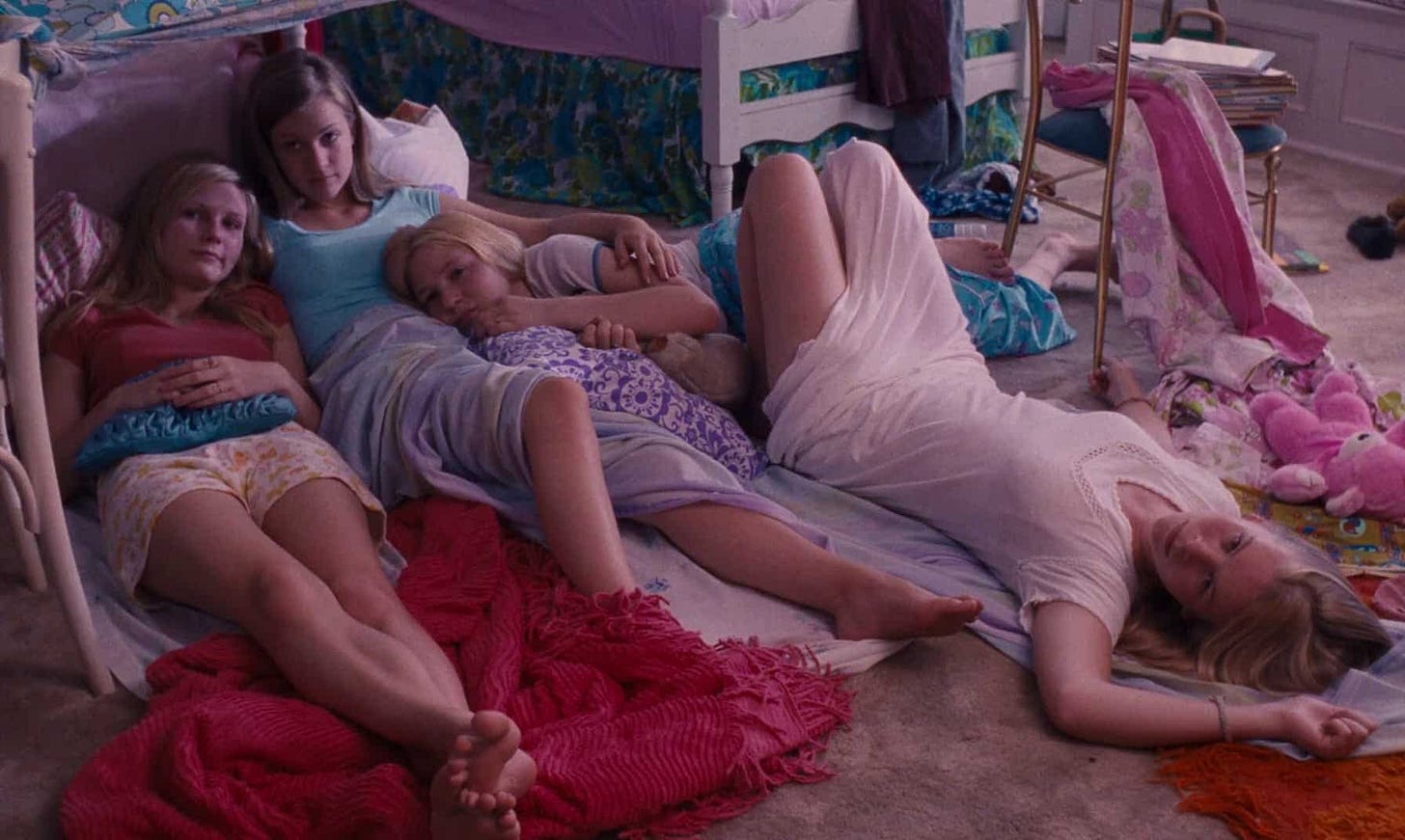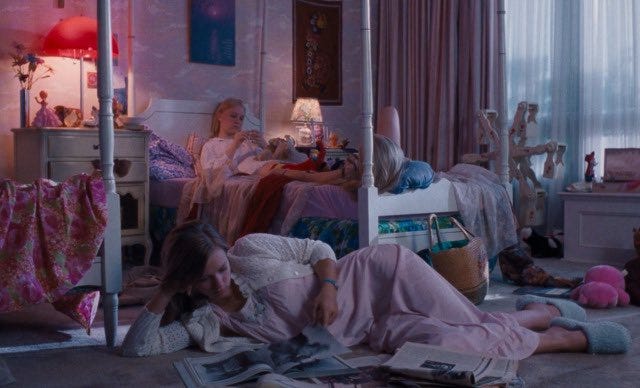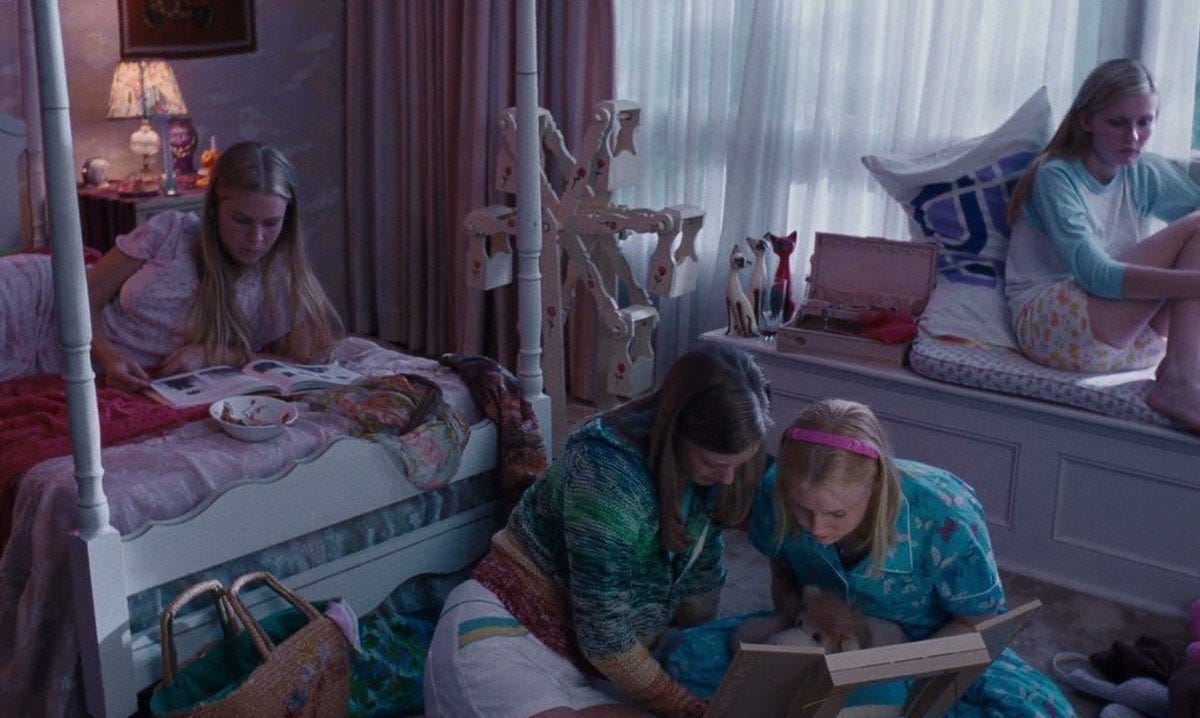The Class of 1999: 'The Virgin Suicides'
Sofia Coppola's funny, sad examination of female sexuality and the male gaze turns 25.
1999 was a historically-great year for film and dramatic narrative as a whole. I’m using my 2024 to look back at, reconsider, and celebrate these stories as they all celebrate their 25th anniversaries. I recently re-reviewed Election; next up on the docket is Ghost Dog: Way of the Samurai. But first… it’s time for…
The Virgin Suicides - written & directed by Sofia Coppola - May 19, 1999
Adapted from a novel by Jeffrey Eugenides, Sofia Coppola’s The Virgin Suicides debuted at the prestigious Cannes Film Festival in the spring of ‘99 before being released in theaters the following year. Even though the movie was only Coppola’s debut feature, she was able to wrangle a formidable cast and crew, because who wouldn’t wanna work with the only actor to ever play both Michael Corleone’s son and Michael Corleone’s daughter? Still, the 29-year-old Coppola’s success was by no means assured, as demonstrated by the world’s indifference to any of the movies her older brother has made without Wes Anderson. The Virgin Suicides made a splash because it’s sad and funny1 and thought-provoking and stylish. Or, put another way: The Virgin Suicides was well-received because it’s really, really good.
Little wonder, then, that Sofia Coppola has since gone on to become almost2 as acclaimed as her father (which, it ought to go without saying, is no small feat). In The Virgin Suicides - as in Christopher Nolan’s Following - we can observe many of the touchstones that now define the director’s career. Female sexuality and all its complexities have been one of the overarching themes of Coppola’s oeuvre, and as you might guess from the title, it’s an interest that does play a large part in The Virgin Suicides… although maybe not the way you’d expect: it’s all about the male gaze.
The events of The Virgin Suicides are recounted for us by an unidentified narrator (Giovanni Ribisi) looking back at his adolescence in Grosse Pointe, Michigan during the mid-‘70s, when he and his male peers became infatuated with the teenage daughters of their math teacher, Mr. Lisbon (James Woods), and his wife (Kathleen Turner), a homemaker.
As the film begins, the youngest daughter, Cecilia (Hanna Hall), has slit her wrists. She survives; when her doctor asks why she tried to kill herself, commenting that she’s “not even old enough to know how bad life gets,” Cecilia replies, “Obviously, Doctor, you've never been a 13-year-old girl.”
Following a Rorschach test, Cecilia’s psychiatrist (Danny DeVito) suggests to her parents, who he deems “strict,” that Cecilia “would benefit by having a social outlet… where she can interact with males her own age.” Mr. and Mrs. Lisbon thus reluctantly host the narrator and his friends in their home for a small, awkward “party,” over which they keep a perpetually-watchful eye.
The party is so lame, in fact, that Cecilia leaves, goes to her room, opens her window, and jumps, impaling herself on the metal fence below. This time, her attempt to end her own life is a success.
Cut ahead a few months, and school hunk Trip Fontaine (Josh Hartnett) begins to pursue the second-youngest Lisbon sister, Lux (Kirsten Dunst). He manages to persuade Mr. and Mrs. Lisbon to let him take Lux to a school dance, on the condition that he also finds dates for the other sisters, Mary (A.J. Cook), Therese (Leslie Hayman), and Bonnie (Chelse Swain). Trip doesn’t have any problem doing this (the other girls’ escorts include a baby-faced Hayden Christensen), and uses the opportunity to get Lux high and drunk before taking her to the football field, where they have sex. Lux falls asleep; Trip abandons her, leaving her to sleep until sunrise.
So furious is Mrs. Lisbon that she pulls the girls out of school and ostensibly puts them on house arrest, going so far as to make Lux burn her record collection. Lux responds to this punishment with sexual promiscuity: “This was around the time we began to see Lux making love on the roof with random boys and men,” the narrator says, revealing that he and his buddies voyeuristically watched these intimate encounters with a telescope and binoculars, as though it were a pornographic performance for their amusement (they even snack on popcorn).
The Lisbon sisters soon begin surreptitiously communicating with the narrator and his pals, culminating in what the boys believe to be an invitation to aid in their escape. But when the young men see that signal and rush in to help liberate the girls, they find that each one has died by a different form of suicide: Bonnie hung herself, Mary put her head in the oven, Therese overdosed on sleeping pills, and Lux self-asphyxiated in the family car.
Not long after, a spill at an unspecified “local plant” causes a foul smell to permeate the air. The boys attend a debutantes’ ball, where the theme is “asphyxiation,” allowing guests to wear gas masks and block out the unpleasant odor. None of them seem to care that this theme is so tasteless, given the Lisbons’ fate; in fact, one drunk man openly mocks the girls, feigning suicide while shouting, “You don’t understand me! I’m a teenager, I got problems!”
Understandably, these events still haunt the narrator and his friends in adulthood, and they continue to obsess over how and why this seemingly-ideal cadre of all-American young women became such a tragedy.
But these fellas are ill-suited detectives for this mystery - for they are incapable of seeing outside of their own experience. “We hoped we might begin to understand what they were feeling,” the narrator tells us after the boys find the diary of the recently deceased Cecilia.
But they don’t actually care about any aspect of the Lisbons that doesn’t pertain directly to them: “How many pages can you write about dying trees?” one of the young men complains, flipping through sections of Cecilia’s journal in search of juicy gossip about her sisters’ possible romantic interests.
Earlier in the film, Cecilia is seen telling her disinterested mother about the ever-growing number of species going extinct, and elsewhere in the diary, she notes the joy experienced by her Lux during a whale-watching expedition; she clearly has a passion for nature and a larger philosophical concern regarding a deteriorating ecological system. This might be a clue regarding why Cecilia didn’t want to go on living, but the boys who profess to be so very interested in these girls dismiss it as boring and inconsequential. The narrator even admits that the boys’ interest in the Lisbon sisters has to do with wish fulfillment, noting that as grown-ups, they remain “happier with dreams than wives.” Later, he adds that “What lingered after [the sisters] was not life, but the most trivial list of mundane facts.”
Similarly, Trip pursues Lux romantically because she won’t give him the time of the day. Most of the women in town are enthralled by his looks as to be putty in his hands, but Lux presents a challenge. However, not only is there no actual connection between Trip and Lux, but Trip isn’t even really interested in making an actual connection with Lux. His father advises him to use eye contact to win Lux over - in other words, to get personal with her - but Trip does the exact opposite, wooing Lux in a sequence where they barely ever look at one another (and P.S., no, the subtext of the educational film they’re watching during this scene is not subtle).
This is to say nothing of him losing interest literally the second Lux has slept with him. Even when we see Trip as an adult (played by Michael Paré, speaking from what is either a psychiatric or rehab facility), he talks about Lux as though she were the love of his life - but his focus remains on the thrill of the chase, not on anything about Lux as a three-dimensional human being.
Truth is, each of the Sisters Lisbon is given only fleeting hints of an individual personality - the three that are not Lux and Cecilia more or less blend into one another, differentiated predominantly by small, arguably inconsequential details (the manner by which they commit suicide and their signatures, superimposed on screening during their introductions, being chief amongst them). And remember, this story is being told to us by one of the boys. In other words, the sisters’ lack of depth isn’t a reflection on them - it’s a reflection on how the men remember them, and how little the men actually cared about them as people in the first place.
It is unsurprising, then, that the possible motive for the girls’ suicides that becomes most enticing to these young men is that the Lisbon sisters need freedom from their very strict parents to explore their burgeoning sexuality. Of course that’s what the men think - they suppose that they will be the ultimate beneficiaries of the sisters’ alleged horniness.
But the repression from which the young Lisbons need to escape is more emotional than sexual. Lux doesn’t have a hard time finding men to sleep with, but Mr. and Mrs. Lisbon are so out of touch with their own feelings that they can’t address or wrestle with their emotions in any meaningful way. After Cecilia dies, Mr. Lisbon is at a loss for ways to grieve that don’t involve watching a Sunday baseball game; Mrs. Lisbon sits, alone, catatonic, in her bedroom, her only visitor a priest (Scott Glenn) who himself can offer no comfort other than reassuring her that Cecilia’s death will be considered an accident by the church (so Cecilia won’t go to Hell); and when the other sisters return to school, the narrator tells us that it was “like nothing happened.” The family either cannot or will not reckon with its profound loss.
Mrs. Lisbon’s grief pushes her, sympathetically but not wisely, to smother (pardon) her daughters. She very forcibly absorbs them into the family home, as represented visually by the way the Lisbons are almost camouflaged in their own house.
Mrs. Lisbon is, in effect, robbing her daughters of their individuality… just as the neighborhood boys do. And yet she professes complete confusion as to why her daughters would kill themselves, asserting that they were “loved”… again, just as the neighborhood boys do.
That’s why sex is presented as a double-edged sword for these young women. Lux thinks she can find authentic human connection in love, or something at least approximating the illusion of love (“Don’t you like me?” she reportedly asks while seducing one guy), but she can’t. Little wonder that the movie is rife with dangerous objects used as phallic symbols: an adult man sharpening a knife between his legs while watching Lux lasciviously, the steel spike that pierces Cecilia’s torso, the model fighter plans Mr. Lisbon shows off during his daughters’ “party” (we also glimpse a man using a very forceful hose, which is also clearly a phallic symbol, albeit one more funny than scary).
Cecilia seems to understand this better than her sisters: the last thing she witnesses at the party before leaping to her doom is the boys making a local kid with Down syndrome perform for her sisters, seemingly unaware that he’s the punchline (he’s never seen again after this scene - the other neighborhood kids are not, in fact, his friends). Might she not sense that there’s no solace to be found in the arms of such cruel romantic suitors?
Oh, and by the way, this is after Cecilia’s psychiatrist - the same one who believed the young girl craved contact with members of the opposite sex - has announced that her initial suicide attempt was just “a cry for help,” not to be taken seriously. All of the men in this movie are, truly, female-illiterate.
Lest anyone write Coppola off as some kind man-hater: Lost in Translation, her sophomore effort, is a romantic comedy that indulges, unquestioningly, in the idea of a relationship between a 52-year-old man and a 17-year-old girl. That’s obviously, er, problematic in and of itself, but there is a key difference between the romance in that movie and the “romance” in The Virgin Suicides: in contrast to the Lisbon sisters, Lost in Translation’s characters find the authentic human connection they crave. That need for something so raw and real may very well be the defining theme of Coppola’s work, as further exemplified in her other films about the tension between sexes, from The Beguiled to Priscilla. Coppola is often described as an “aesthete,” but it seems to me that the one thing she absolutely cannot stand is artifice.
The Class of 1999
In a very dark way, of course. My personal favorite joke is that when the Lisbons go to bury Cecilia, their funeral procession is blocked by cemetery workers on strike, one of whom has a picked bearing the slogan “You respect the dead, now respect the living!”
Francis was a rock star who won five Oscars by the age of 35 and two Palme d'Ors before he hit 40, and the original pair of Godfather films were both mega-blockbusters. Sofia is extremely well-respected, but, no, she’s not as big of a deal as her poppa in his prime.








